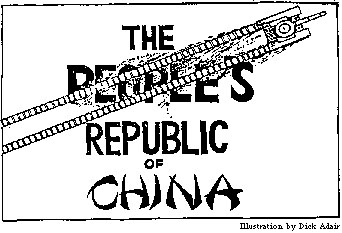The Washington Post, June 22, 1994

From Tianamen to Hong Kong
By Martin C.M. Lee
 Tiananmen worked.
Tiananmen worked.
- Five years after the massacre at Tiananmen Square, China's top party cadres have pronounced it a success, giving their own historical verdict that, "Without the resolute measures taken then, China would not enjoy today's stability."
- President Jiang Zemin has further declared, "A bad thing has been turned into a good thing." China's triumphant return to the world community on a wave of economic growth and Bejing's decisive victory in forcing President Clinton to sever the MFN link between human rights and trade would seem to prove his point.
- The legions of world leaders who have trooped to Beijing to get a piece of the booming China market further bolster President Jiang's argument that "History shows that anything conducive to our national stability is good."
- As far as China is concerned, the end very much justifies the means -- even if the means are a massacre. China's Communist leaders have along history of rewriting history, but Beijingís latest interpretation of June 4 has particularly chilling implications for Hong Kong.
- In a little over 1,000 days, Hong Kong will be part of China, and Beijing's newfound confidence that Tiananmen worked casts a long shadow. As pro-democracy demonstrators in Tiananmen Square were not "conducive" to China's national stability, so Hong Kong's free society is now under siege because Beijing is unable to distinguish between the sort of normal activity that takes place here every day and counterrevolutionary activity, which it believes must be crushed.
- Hong Kong has changed dramatically in the five years since China opened fire on the pro-democracy demonstrators, and especially since our first democratic elections in 1991. Public rallies and street marches in favor of democratic reform are a part of daily Hong Kong life. Press conferences, petitions and campaigns -- dealing with everything from human rights to housing costs -- are the norm.
- Hong Kong's 6 million citizens cherish our civil liberties and freedoms principally because the territory is made up of several generations of refugees from Chinaís political crackdowns, and we are actuely aware that these freedoms do not exist just a few short miles away across the Chinese border.
- During a century and a half of British colonial rule, the people of Hong Kong were denied democratic government. But in 1984, Britain signed the Joint Declaration with China, agreeing to had Hong Kong over on June 30, 1997. For Hong Kong, the most important part of the international treaty was the proimse that we, the people of Hong Kong, would have a fully elected legislature and would be allowed to govern ourselves with autonomy in all matters except defense and foreign affairs.
- But instead of the promised autonomy over our own affairs, the people of Hong Kong increasingly find the long arm of China reaching into our daily lives: the bullying of politicians, threats to destroy our common law system and the announcement that Hong Kong's Bill of Rights will have o be abolished after 1997. Democratic reform is under attack, and as China's economic might and clout grow, so does its interest in absolute control over Hong Kong. Hong Kong's business community has been brought to heel with threats to remove china trade, and companies and individuals supporting democratic reform have been targeted for retribution.
- Hong Kong is still the freest society in Asia. But as 1997 draws closer, that is changin rapidly. The threatened loss of press freedom and the refusal of the British government to set up important institutions such as a Human Rights Commission mean that Hong Kong is well on its way to becoming a human rights tragedy.
- Our great concern is that while Britian and China will continue to pay lip service to the Joint Delcaration's promise of autonoy and "one country, two systems" -- at least until the takeover ñ in practice, Beijing wants strict control over Hong Kong well before 1997.
- A desire for control is certainly behind Bejing's harsh opposition to Hong Kong Governor Chris Patten's modest democratic reforms to broaden the franchise for Hong Kong's last elections under British rule. Control is also th reason Chinese authorities recently announced that our legislature and the two lower tiers of elected bodies will be axed when Beijing takes over in 1997. These efforts are directed at crippling the powers and autonomy of Hong Kongís people during the transition period so there will be total control in Hong Kong after 1997.
- It is clear to the people of Hong Kong that China is laying the groundwork for a very different Hong Kong after 1997 and that this may well be our last-ditch effort to build enough democracy into Hong Kong's still undemocratic colonial system to preserve our rule of law, way of life and Hong Kongís role as the heart of the Pacific Rim.
- Despite the impressive economic gains in China, our people recognize that the difference in approach to human rights and democracy -- in combination with a fundamental misunderstnaing of the values ad practices of a free society -- will power te greatest threat to Hong Kong in the transition to Chinese sovereignty.
- Hong Kong has not forgotten Tiananmen Square. As we remember the deaths of our But we know that so long as China's Communist leadership remains willing to sacrifice freedom on the altar of "national stability," the world may yet commemorate another tragedy: the Hong Kong that once was, but is no more.
Copyright © 1998 The Democratic Party. All Rights Reserved.
Next Media Group Management Ltd. owns the copyright of some featured photographs, the use of which for commercial purposes will result in legal prosecution.